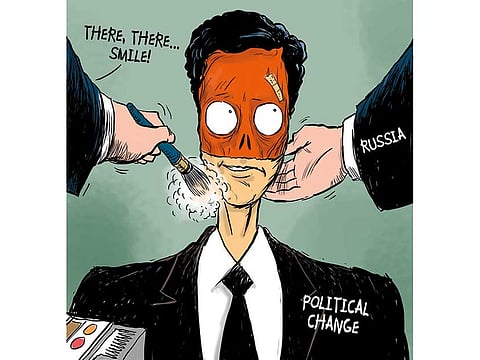Syrian political change will be cosmetic
Putin is carefully re-launching a process of constitutional reform that suits the Kremlin

When after ten years of negotiations, Syrian-Israeli peace talks collapsed in early 2000, many observers wondered whether they could have ever led to anything, claiming that neither side was interested in a peace treaty — only a process. Pretty much, that attitude still applies to the current political process in Syria, which started through UN channels back in 2014 and has dragged on in endless and rather useless talks ever since.
Both the Syrian government and its opposition were — and remain — light years apart as to how the Syrian endgame should look like. Syria, backed by Russia and Iran, insists that the ceiling is quite low, leading, at best, to a new constitution and early parliamentary elections, refusing to discuss the fate and future of the Syrian presidency. The mainstream Saudi-backed opposition, for its part, still insisted that for any process to start, President Bashar Al Assad needs to leave power first — a demand that is starting to sound increasingly unrealistic, after recent battlefield victories for Damascus and its allies in the capital and its East Ghouta countryside, which deprives the opposition of their last major strongholds, and after losing western Aleppo back in December 2016. Last week, Al Assad and Russian President Vladimir Putin met at the Black Sea resort of Sochi, and they agreed to breath life into the morbid process, “frozen” since last January.
Optimists cheered, seeing a window of opportunity, but realists in both camps knew better, realising that the process will lead to nothing but cosmetic change — at best. “We know that this will not be easy,” said Al Assad, adding: “I confirm to President Putin that Syria will send a list of its delegates to the constitutional committee to discuss amendments to the current constitution. This will be done as soon as possible.” He was referring to a committee that both sides agreed to set up at the Sochi National Dialogue Conference four months ago, mandated to review — but not amend — Syria’s 2012 charter. That charter famously dropped Article 8, which gave the Baath Party constitutional authority as the “leader of state and society” but it kept all executive, judicial, military and security affairs firmly in the hands of the presidency.
Although attended by more than 1,500 delegates, including a handful of big names from the anti-regime bloc, mainstream opposition parties were critical of Sochi, saying that it was tailor-made to fit Putin’s version of the Syrian endgame, since it contained nothing whatsoever about decapitation. Even the former demand for a proper power-sharing formula was scrapped.
Now, Putin is toying with the idea of holding a second round of talks, or Sochi II, possibly as early as next July, after armed groups were crushed in the countryside of Homs and Damascus, and in Deir Al Zour City along the Euphrates River. The government delegation is in a much stronger negotiating position, he believes, having regained all urban centres, except for cities lying across the Euphrates, which are the in hands of the Americans and their Kurdish allies, in the Syrian south, and in the strategic city of Idlib, which is still run by a coalition of Islamic militias — including Hayat Tahrir Al Sham, the formal Al Qaida branch in Syria.
Damascus insists that no early presidential elections will happen before 2021, which is when Al Assad’s third term expires, adding that he gets to run for two additional terms that would end in 2035.
Constitutional committee
What the next session of Sochi will focus only on is the 50-man constitutional committee, which according to the Russians, needs to be signed off by Al Assad — something that hardliners in the opposition will never accept. At the latest summit, the Syrian President agreed to put forth a list of names to join the committee, while Syrian lawmakers from Damascus — with Russian support — are insisting that the Syrian government gets 51 per cent of seats on the committee, with veto power. Before they get to that state, lawmakers need to agree on a timetable for the assembly, the framework of its operation, and its actual text — based on Russian proposals. Once through with the constitution, Damascus is insisting that it is put to a national referendum — another demand that is likely to get drowned by Saudi Arabia and Turkey, unless they are talked into a compromise by Putin himself.
This essentially drowns the former political process, known as Geneva I, which was agreed upon in the summer of 2012, calling for regime change. That process is dead, insist both the Russians and Iranians, and nobody in the Trump Administration seems very enthusiastic about reviving it.
Investing in the US President’s lack of interest, Putin is carefully re-launching a process that only leads to constitutional reform and cosmetic political change.
Sochi I succeeded in breaking the psychological barrier of the two warring factions, putting them on the same pulpit for the first time in seven years.
Those who attended Sochi realised that if they wanted to be part of the country’s future, they had to deal with the Russians as a matter of reality, given that they were clearly in Syria to stay. Those terms have not changed since the Russians entered the battlefield in 2015, and they envision a process handled fully by Russian diplomats, leading to results that suit the interests of the Kremlin.
Sami Moubayed is a Syrian historian and former Carnegie scholar. He is also the author of Under the Black Flag: At the frontier of the New Jihad.



